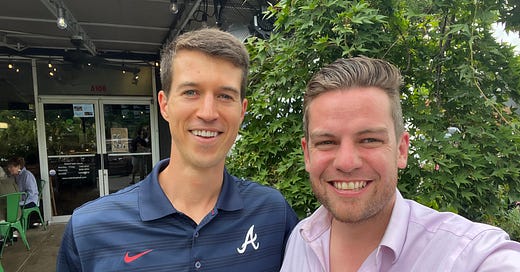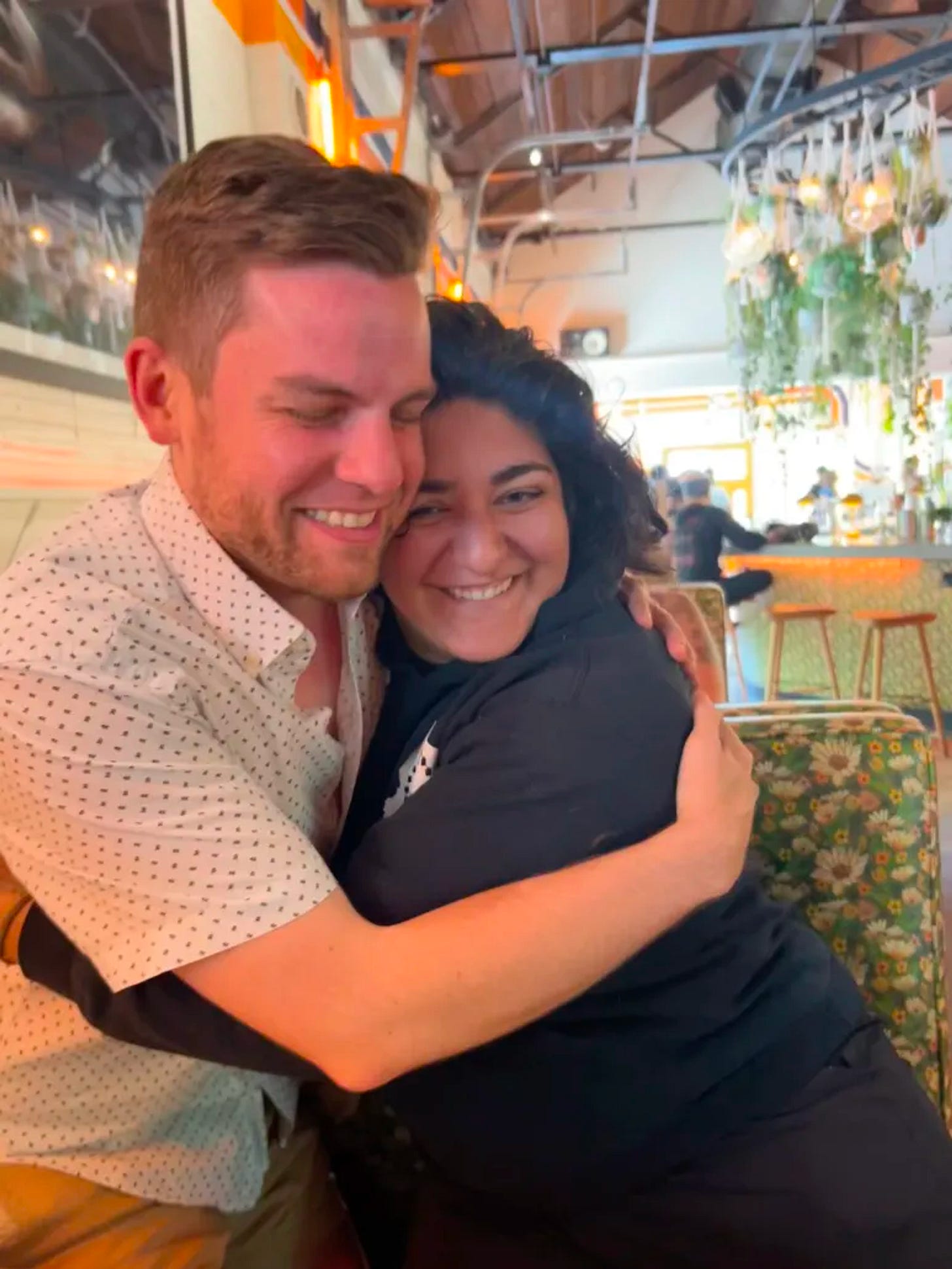100 Atlanta Coffees, 001: Matt Westmoreland
I’m grabbing coffee with 100 good people in Atlanta and sharing inspiring takeaways - the first edition is with City Councilman Matt Westmoreland.
100 Atlanta Coffees, 001 with Atlanta City Councilman Matt Westmoreland
Met at MetroFresh in Midtown
This was not the conversation I expected to have with Matt.
He’s a champion of education, especially equitable access to early-childhood education. I thought we’d cover how technology might change curricula delivery for Atlanta schools. I hoped to pick his brain on one of my favorite topics, electric bicycles, specifically the pipedream that Atlanta might become the e-bike capital of North America.
But seemingly everything in Matt’s world the last few months has come back to the polarizing debate around Atlanta’s new public safety training center, aka ‘Cop City’, which passed the Atlanta City Council by an 11-4 vote on June 12 (technically June 13) following a hotly-contested *17 hour* council meeting. Matt was one of the yes votes.
We wound up diving into what allows us to feel trust and unity in a city that is often divided at the intersection of race and economics. The current climate of public discourse is making it more difficult to have a principled discussion that begins from a place of assumed positive intent. Technological advances may exacerbate the erosion of our common ground.
Matt’s political career is enabled by proximity
Though he went to public school, Matt grew up in a relatively homogenous part of Atlanta before heading to Princeton. That’s not the surest route for a white guy to be elected to the school board at age 26 and the city council at 30.
Matt described plenty of times when he attended a neighborhood meeting or spoke at a church gathering in a predominantly Black part of Atlanta. The feeling of ‘Who is this guy?’ was palpable, until they learned he’d spent four years teaching history at Carver Early College High School in southeast Atlanta.
From there, the significance of his obvious differences in lived experience diminished. Everyone had either attended Carver, knew someone who had, or at least held the school in high regard. Matt’s experience at Carver proved that his time and energy, in addition to his words, focused on promoting inclusive education. This created the ability for him to contribute to the people and communities he hoped to serve.
The changing public tenor reflects our eroding sense of solidarity
The training center policy debate provided a potent cocktail for polarization that got conflated into being representative of entire belief systems and ways of seeing the world. People’s emotions were amplified by understandable frustration at lacking input in the democratic process, since the location of the site was already decided before public discourse began.
I asked Matt how being in public is different for him since this process began. His nervous system is more activated from the moment he wakes up, wondering what will await him in his inbox. He used to be recognized mostly only by people he knows, now he wonders if someone’s about to scream that he’s a fascist.
I found myself looking around, and did indeed notice a few folks giving him long looks on their way by our outdoor lunch table. Luckily there were no incidents.
Matt described how one of the hardest parts of this process has been seeing his colleagues deal with public hostility, especially those with families. Numerous city council members received death threats, leading to police presences at their houses.
The Atlanta City Council has 16 members: the president, 12 members elected from districts within the city, and three at-large posts. These folks know each other intimately and work together consistently, and while they certainly have differences in policy viewpoints, there’s a lot of friendship and professional camaraderie.
Matt and fellow council-member Liliana Bakhtiari, who voted no to the training center, sat for an article with Atlanta’s Maria Saporta to reflect on what went wrong with the entire process and how to restore unity. They posted the below photo at Muchacho (an awesome spot I’ll visit on a future 100 Atlanta Coffee).
Liliana received a shocking amount of Twitter vitriol even for just having a meal and hugging Matt, her fellow 35-year-old, gay, native-Atlantan colleague. To the highly vocal, polarized public, one policy debate was supposed to make them mortal enemies.
Looking ahead, generative AI could make the dynamic of public distrust for officials considerably worse.
The first wave of mass-AI was curation, with algorithmically tailored newsfeeds that put us into self-reinforcing ideological loops. I’d argue that we haven’t quite figured out how to navigate those challenges yet as a democratic society.
The next AI wave after curation will be creation by generative AI machines, like ChatGPT and others. Today you can be pretty darn certain that the picture of Matt and Liliana is real. What about when deep fakes are everywhere, and you can’t trust if a quote you hear in Matt’s voice, perhaps even coming from a video of Matt, is something he actually said?
There are practical responses. We’ll need rapid, reliable source verification for what’s real online. I’m hoping that a verification gold-standard emerges.
There are also more spiritual, philosophical angles to consider. Matt’s been an active member of Peachtree Road United Methodist Church his entire life. Ideally, that could allow you to safely assume he’s not murderous or evil, but alas, Christianity has ceded the moral high ground. Is there potential for a more unifying ideology that allows us to disagree from a starting point of shared humanity?
We need to encourage good people to lead us.
Regardless of how you feel about Matt’s policies generally or his decision in this specific vote, he is an undeniably committed public servant doing his best to work for the people of Atlanta. He’s making practically no money compared to his private sector alternatives. He’s sacrificing in many ways to be in the public eye. If people like Matt and Liliana decide that enough is enough and they quit, we’re worse off.
And it doesn’t seem like he’s going anywhere - if anything, I perceived his resolve to serve the city as stronger than ever. But still, I couldn’t fault him if he were considering doing something else.
We’re going to have to figure out how to positively incentivize great people to serve and lead us. While emerging technologies might make lawmakers’ jobs harder, they also make their success even more important to protecting democracy and building towards the kind of places we want to live.
I appreciated Liliana’s quote about community and the Atlanta Way:
“There are people who have totally lost faith, and we are actually creating a more divisive community. The movement was hijacked in some instances by people on the fringe. I fully support the right to protest, and I encourage debate. But what I do not condone are threats, retaliation and overt efforts to intimidate anyone for having a different point of view. Community is at the crux of everything we do in local government. For the Atlanta Way to prove successful, we have to get to a place where we view each other as neighbors rather than the opposition.” - Liliana Bakhtiari
For Reflection & Discussion:
I presented a negative perspective on how algorithmic newsfeeds and deep fakes challenge our ability to discern truth from falsehood, establish reliable sources of information, and maintain trust in public figures. What is the counter-argument; how can technology help with this?
Do the vast majority of your friends look and think like you? What are the areas in your life where you’re most proximate to people who have a different lived experience than you, both physically and virtually?
What are some accessible ways we can get out of our comfort zones and be around people who have different perspectives from our own?
About MetroFresh:
It’s one of my very favorite Atlanta spots, with Midtown as my preferred location (though parking is tough).
The ‘Sampler’ is the best value, and the ‘Mitchili’ (turkey chili named after owner Mitchell Anderson) is my favorite.
About 100 Atlanta Coffees:
Through LEAD Atlanta, church, and business networking, I’ve gotten to meet some amazing folks who have sharpened my thinking, broadened my understanding, and inspired me.
I decided to publish 100 of these coffees and my reflections as a way to shine a light on some of the good souls, and local spots, in our city.
I’ll mix in some people I already know, but my hope is to ask each coffee guest to recommend someone new for me to meet, expanding my Atlanta friend group and introducing us to dynamic people across business, government, religion, the arts, and more.
For the record, I definitely don’t intend for them to usually be this long.
Subscribe here to follow along:







